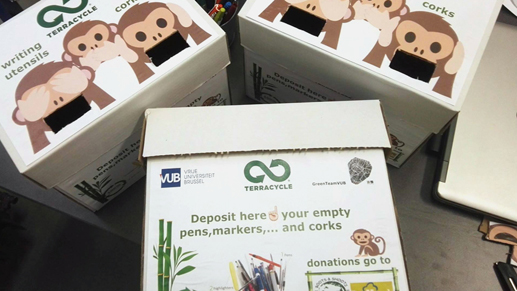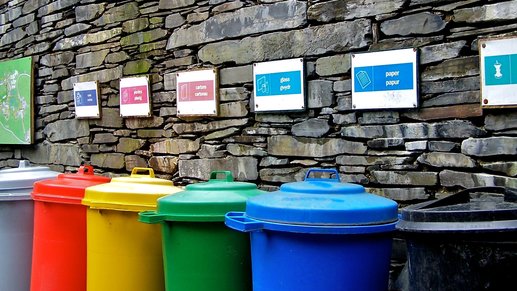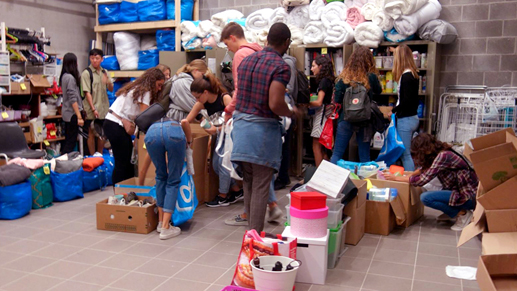8 university recycling ideas to make your campus greener
Recycling at your university achieves that fewer materials are burned, buried in the ground or washed away into the ocean. Instead, these resources can be re-used again to generate economic value and benefit people. Recycling is a core aspect of becoming a sustainable university. In this blogpost, you learn about 8 university recycling projects.
What are the benefits of recycling?
Recycling sounds boring, doesn’t it? It’s dirty and unsexy. But that might just be your first impression. Here are some arguments why you might want to care about the dirty waste that students and staff leave behind:
- Your university saves money, by paying less for waste going to landfill or incineration. Your university might even earn money, by selling cardboard, glass or plastic.
- Everybody at your university throws away garbage. Students and staff immediately see if a recycling system is in place or not. If you want people to care about environmental issues, then improving recycling is a good way to avoid common complaints that your university doesn’t do enough on sustainability.
- Litter can spoil beautiful campus gardens, incineration contributes to climate change, as well as seagulls and fish suffocate from plastic. University recycling can help you to reduce your university’s environmental impacts.
- The resources that go into the goods, buildings and gadgets that make your modern life so convenient are limited. Finding ways to use less material inputs for products and to re-use materials in a circular economy is necessary for long-term prosperity.

Recycling projects are a key practice of a sustainable university.
Sign-up to the FREE online course to establish your Green Office
5 weeks. One email per week. Unsubscribe at any time. By signing up, you agree to our data policy.
What does recycling mean for your university?
In a nutshell: Recycling at your university or college achieves that fewer materials are burned, buried in the ground or washed away into the ocean. Instead, these resources can be re-used again to generate economic value and benefit people.
Here are some materials to recycle and re-use:
- Organic materials
- Glass
- Electronics
- Metals and cans
- Paper
- Clothes
- Furniture
- Plastics
You can recycle these materials by implementing recycling project ideas.
Tip: Often the hotspots where recycling should take place are the library (paper), sports events (plastics), cafeteria and other common areas that students and staff use to take breaks (organic materials), as well as student dormitories, offices and classrooms (about everything).

1st recycling idea: Distribute boxes in offices to recycle pens or batteries
What are great university recycling ideas?
(1) Understand waste management practices
Before you want to change anything, it helps if you understand how the current system operates. Ask yourself some of these questions:
- Who’s currently responsible for waste management and recycling?
- Is a recycling policy in place?
- How is waste collected and by whom?
- What governmental regulations affect what materials your university must recycle?
(2) Gather and analyse data
To act strategically, it’s important that you establish a baseline. Establish a baseline by asking yourself these questions:
- Can you get data from the waste manager or waste haulier about the types of waste that are collected?
- How much is currently recycled?
- Is this data available for different buildings and over multiple years?
- What trends can you see?
- Based on this data, can you identify some buildings that are ‘recycling hot spots’ or where a lot of waste goes to landfill? These are areas you might want to target first.
(3) Standardise bins and labelling
Some buildings might not have any bins. Also, the types of bins and how they are labelled might differ, which can be very confusing for people. Standardising the types of bins and how they are labelled across all buildings makes university recycling much easier.
As a first step, it helps if you examine buildings:
- Are recycling bins installed?
- Where they are placed?
- How are they labelled?
Then develop a proposal with the waste coordinator or the director of facility services on how this could be improved.

Labelling bins is a good recycling project idea
(4) Set a university recycling target
A university-wide recycling target can help you to set a clear ambition on how much to improve recycling at your university. Without a target, it might be difficult to legitimize why money and time should be invested to improve recycling. Once you have a university-wide target, you can easier legitimise your projects, and hold the institution accountable if goals aren’t met.
(5) Run a competition
You have a baseline, standardized bins, put up labels and set a target. But how do you improve recycling rates? A great way is to run competitions. Challenge buildings, faculties or dormitories to improve their recycling rate. Track progress and award winners with nice prizes.
For inspiration, check out RecycleMania or these 9 tips from Harvard University for running a recycling competition. You can also run Green Impact at your university and award points to staff teams for recycling actions that they implement.
(6) Run events to spread recycling ideas
You might already run events to raise awareness, educate and change behaviours. If not, here are some university recycling project ideas to get you started:
- Run an upcycling workshop where students use waste to produce bags, wallets or other products
- Organise a repair cafe where students and staff bring their broken things and repair them
- Carry out a Swap Shop or Swap Party where people bring their old clothes and exchange them
- Collect scrap paper that has been printed on one side and then run an event where students bind papers together into new folders
- Screen a sustainability documentary about waste and then discuss with people what could be done to improve recycling on campus
- Train student volunteers as Recycling Heroes and have them stand next to bins in busy areas to explain to people how to recycle their waste
(Not enough ideas? Explore our blogpost to get 10 more project ideas on how to engage students on the Sustainable Development Goals.)

Run a swap shop to exchange 2nd hand clothes
(7) Change procurement contracts and practices
Procurement describes the process through which your university buys products and services on the market. The procurement department decides what furniture, food and electronics are bought, and how they are discarded.
Here are some university recycling ideas you could implement together with your procurement department:
- Purchase second-hand furniture, furniture that lasts longer, or that is easier to recycle
- Oblige suppliers of computers, mobile phones and monitors to take them back, once you want to get rid of them again
- Order products in bulk or require less packaging
- Make it part of the catering contract that the caterer strives to reduce food waste
(8) Address low-threshold areas
In addition to these events and procurement practices, you could act upon the following university recycling projects:
- Introduce double-sided printing as the standard settings of printers
- Install hand driers in restrooms, and remove hand towels
- Ban water bottles entirely from campus and install refill stations
- Collect e-Waste centrally and donate it to a charity
- Deliver publications electronically, instead of printing them






